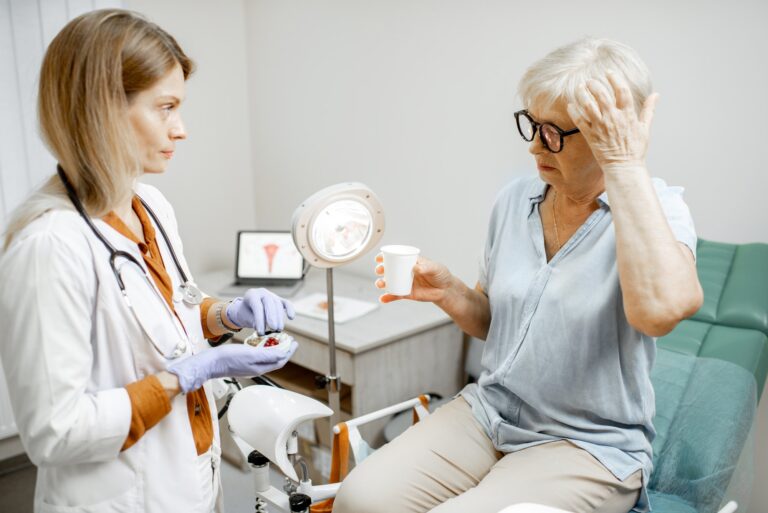
5 Menopause Support Complex Supplement to Help Ease Symptoms
Menopause support complexes are dietary supplements with herbal extracts and vitamins aimed at alleviating symptoms during menopause
Ahhh, menopause. The time of life usually reserved for “the change”, or dreaded “hot flashes.” It can be overwhelming to think about all the symptoms associated with this time, along with the bombardment of information about what to do. Luckily for you, we’re here to provide some insightful facts and tips about the symptoms to look out for, as well as how to treat them. So, without further ado, let’s dive into the world of menopause and break it down into more manageable pieces!
Menopause is the natural and permanent end of a woman’s reproductive years, marked by the end of her menstrual cycle. It typically occurs between ages 45 and 55, and can begin as early as age 40 in some women. Menopause is caused when the ovaries stop releasing eggs and producing estrogen—the hormonal changes associated with menopause can cause physical and emotional effects that vary greatly from woman to woman. On average, it takes four years for menopausal symptoms to pass.
Though this process is considered a normal part of aging, there are mixed opinions concerning its impact on a woman’s quality of life. On one side, some people argue that menopause is liberating—it marks an important phase in a woman’s life, where she is no longer bound by the physical and emotional constraints of her menstrual cycle. Others, however, disagree—some women have found the symptoms of menopause to be more problematic than liberating, citing the inconvenient physical changes associated with it as a contributor to depression or anxiety.
No matter which side of the debate you fall on, it’s important to be familiar with what symptoms may arise during this period of transition into older age. In our next section, we will take a closer look at some common physical symptoms of menopause so that you know what to look out for in your own experience.

Menopause is a natural part of aging and can bring a variety of physical symptoms, including changes in hormone levels, changes in metabolism, and changes in skin health. During menopause, there is a drop in estrogen and progesterone levels, which can result in bone loss due to diminished bone density. This can lead to osteoporosis, a condition where the bones become more fragile and brittle. Other physical symptoms include thinning hair and dry skin, both of which are caused by decreased production of sebum. The decrease in hormones also affects metabolism which results in fatigue, weight gain or weight loss, increased cholesterol levels and an increase in insulin sensitivity.
Weight gain during menopause is controversial. While some studies suggest that women who experience menopause tend to gain more weight than those who do not, this could be attributed to lifestyle changes as women age as well. It is important for women going through menopause to maintain a healthy diet and exercise regularly – not only to help manage the side effects of menopause but also to reduce their risk of chronic diseases associated with aging such as diabetes and heart disease.
The physical symptoms of menopause can cause discomfort and create many challenges for those going through it. However, understanding the underlying mechanisms associated with these changes can help inform treatment options that focus on reducing symptom severity while safeguarding long-term health.
Hot flashes and night sweats are often experienced along with the physical symptoms of menopause. Understanding how best to manage these unwelcome situations will be examined in the next section.
Menopause is a natural part of aging which can bring about physical symptoms such as changes in hormone and metabolisms levels, bone loss due to decreased bone density, and thinning hair or dry skin due to decreased production of sebum. Weight gain during menopause is controversial, but maintaining a healthy diet and exercising regularly can help to manage the side effects while reducing risk of chronic diseases associated with aging. Hot flashes and night sweats are also common during menopause, and understanding how to best manage these should be further examined.
When it comes to menopause, hot flashes and night sweats are some of the most common symptoms that women experience. Hot flashes involve a sensation of intense heat that can be felt on the chest, neck, and face. They can last a few seconds or several minutes and generally occur during the day. Night sweats usually happen during sleep in the form of drenching perspiration, causing a woman to wake up feeling warm and uncomfortable.
While hot flashes and night sweats affect many women as they transition into menopause, there is still debate about what causes these symptoms. Some researchers suggest that hot flashes are caused by an alteration in thermoregulatory control in which the body’s internal temperature becomes too unstable and cannot regulate itself properly. Other researchers believe the cause may be related to hormone fluctuations because the decrease in estrogen levels at menopause can disrupt the body’s cooling mechanisms.
Regardless of their cause, hot flashes and night sweats can be disruptive and have a considerable impact on quality of life. Fortunately, physicians have some strategies to help minimize their impact. These include lifestyle changes such as avoiding exposure to too much heat; eating less spicy food; exercise; using fans or air-conditioners; wearing lightweight clothing; avoiding alcohol, caffeine, smoking and sleeping in a cool room—all these strategies may provide immediate relief from symptoms. In addition, hormone replacement therapy (HRT) has been shown to be effective in reducing hot flashes and night sweats in some women.
Overall, it is important for postmenopausal women to understand that hot flashes and night sweats can affect them even if hormone levels appear to be normal or if they don’t take any HRT medication. By making positive lifestyle changes and speaking with their physicians about appropriate treatment for their symptoms, postmenopausal women may be able to reduce the impact of hot flashes and night sweats on their daily lives.
Changes in weight are a common symptom of menopause, with many women reporting changes in body size during the transition. It is important to note that what can occur is not necessarily a sudden and dramatic increase or decrease in weight, but rather fluctuations as the body adjusts to changing hormones. Women may gain weight around their middle, while others may lose it from other areas of their body.
It’s easy to become disheartened with physical changes due to menopause, so it’s important to keep in mind that these changes are a normal part of healthy aging. However, making small adjustments to diet and exercise can make a big difference in managing changes in weight. Eating whole foods such as fruits and vegetables, grains, fish protein and healthy fats such as olive oil can help sustain healthy energy levels and regulate appetite. Exercise also plays a role – not only does it burn calories, but regular physical activity helps maintain strength and improve cardiovascular health.
That said, not everyone responds the same way to lifestyle changes. Some women simply need additional support for managing the effects of menopause on their bodies. If you feel your menopause symptoms are causing significant disruptions in your life or physical discomfort, consider consulting with your physician about hormone therapy or other treatments options.

During menopause, levels of two crucial hormones fluctuate—estrogen and progesterone. Estrogen serves many purposes – from regulating the menstrual cycle to supporting heart health – but it also plays an essential role in women’s sexual health and mood. Meanwhile, progesterone helps balance the effects of estrogen and helps prepare the body for pregnancy each month.
At menopause, when women are no longer ovulating every month, their hormone production changes dramatically as ovaries reduce or stop producing these vital hormones. These dramatic shifts in hormonal output lead to various menopausal symptoms such as hot flashes, night sweats, sleep disturbances, and altered moods. Additionally, some research suggests that prolonged changes to hormone levels may even contribute to cognitive decline associated with the aging process.
On one hand, these fluctuations in hormone levels can present many physical and emotional challenges for aging women; however, there is a flip side to this biological coin. In some cases, lower hormonal outputs can be beneficial when a woman’s hormone levels were once too high or too erratic previously. For example, patients suffering from endometriosis due to an overproduction of estrogen may find relief through subsequent drops in hormonal output later in life as they enter menopause.
The body undergoes great changes during this period of transformation as psychological, physiological, and endocrine systems adjust accordingly. This section discussed the significant shift in hormone levels during menopause and how this change can affect a woman’s physical and mental well-being. The next section will turn its focus on examining how these fluctuations of sex hormones will impact glands that produce other hormones within our endocrine system.
The endocrine system is a complex network of hormones and glands that regulate vital biological processes in the human body. During menopause, significant changes in the endocrine system result in hormonal imbalances that can trigger an array of physical, psychological and emotional symptoms.
One of the most prominent changes to the endocrine system involves a decrease in estrogen and progesterone production. As these two key hormones become depleted during menopause, there are a variety of symptoms that may arise, such as hot flashes, night sweats, headaches, and insomnia. Also, due to a drop in estrogen levels, there is an increased risk of osteoporosis as well as other metabolic disorders.
The impact of hormonal imbalances on the brain is also noteworthy. While some women experience improved memory during and after menopause, many others may face mental and cognitive challenges stemming from changes in hormone levels. These issues include difficulty concentrating or completing tasks, mood swings, anxiety, depression and irritability. Again, despite some possible benefits associated with changes in hormone production during menopause, it is important to understand the potential consequences related to this transition period from midlife to postmenopausal years.
Overall, it appears that changes to the endocrine system play an integral role in determining the physical, mental and emotional symptoms experienced by many women during menopause. That said, it is not known precisely why or how these changes manifest themselves beyond direct changes to hormone production or reception. With this in mind the next section will discuss what causes menopause and how those factors influence our understanding of the endocrine system’s role during this transitional period of life.
Menopause, the end of menstruation and fertility, is a natural process that occurs in women when they reach a certain age. Several factors can cause menopause, with two primary theories. The first theory is that it is caused by aging; as we age our bodies reduce their ability to produce hormones like estrogen. This reduction in hormone levels leads to the end of reproductive years and the onset of menopause.
The second theory relates to genetics, with some scientists suggesting that there may be a gene located on the X chromosome involved in ovarian development that may influence the timing of menopause. Although this theory has not been proven, research points to a link between family history and age at menopause onset; if your mother or sisters went through menopause early, you are more likely to go through it at an earlier age as well.
Although it’s difficult to definitively identify what causes menopause, most experts agree that biology plays a role for all women. As we age, our hormone production decreases naturally, but our lifestyle choices can also impact how quickly this process begins. Eating healthy foods and staying active can help strengthen your reproductive system and slow down the onset of menopause.
Now that we’ve discussed what causes menopause, let’s turn our attention to the emotional symptoms associated with this transition. In the next section, we will explore how to cope with the rollercoaster of emotions commonly experienced during menopause.

The emotional symptoms of menopause are often overlooked but are just as important to understand. As women approach menopause, their hormone levels drop significantly. This hormonal shift can bring about a variety of emotional symptoms ranging from mild mood swings to more serious symptoms such as anxiety and depression. It is important to note that these emotional changes are normal and should not be brushed off or minimized.
Mood swings can include sudden shifts in mood or feeling irritable or easily upset. Some women may experience feeling overwhelmed, blue, sad, and stressed out more often than usual. These feelings can also be accompanied by tearfulness or feelings of apathy. On the other hand, some report feeling more confident and empowered even if they may be struggling with other emotions associated with menopause.
Without proper medical intervention, these emotional symptoms can become more severe and have a greater effect on quality of life. While it is true that some women may experience no significant emotoinal changes during menopause, it is important to recognize when these symptoms become more regular and persistent. Anxiety is a very common symptom among women during menopause, with many reporting an increase in panic attacks or fearful thoughts. Those who already have an anxiety disorder should consider speaking with their doctor if they sense heightened levels of worry or physical tension due to their changing hormones.
Depression is another significant risk factor during the menopausal transition. Women at midlife are twice as likely to struggle with depression compared to those before this age range. Women undergoing menopause may complain of lack of enjoyment for activities they used to find enjoyable or an overall lack of energy due to fatigue. It’s important for women along every point of the spectrum – from mild mood changes to extreme psychological symptoms – that they seek support from family and friends as well as professional medical help if needed.
Recognizing the wide range of emotional symptoms during menopause is key for ensuring appropriate medical care and treatment when needed. The next section will discuss mood changes, anxiety and how best to cope with them during this transitional period in a woman’s life..
Mood changes and anxiety are highly common complaints during menopause. Hot flashes, night sweats, fatigue, and difficulty sleeping can all contribute to the development of depression and other mood disorders. On the other hand, some women find that these symptoms can cause them to feel more energized in comparison to how they felt pre-menopause. Women may also report feeling more self-assured after overcoming the challenges posed by menopausal symptoms.
The experience of menopause-related mood swings is highly individual and can be difficult to predict or treat effectively. Hormonal activity within the body fluctuates significantly during this period, which may lead to higher levels of stress hormones such as cortisol and adrenaline. These hormones can make individuals feel more anxious or trigger a flight or fight response even in the absence of any real danger. As a result, it is important for healthcare professionals to recognize and account for the potential effects of hormonal fluctuations on a woman’s mental health.
Studies have found that women are at greater risk of developing depression during menopause than at any other stage of life due to these hormonal shifts. Consequently, it is important for women going through this life transition to check in with themselves often and be honest about how they are feeling so they can access appropriate help if needed.
Fortunately, there are many treatments available to help minimize the effects of menopausal symptoms on a woman’s mental health. This treatment ranges from lifestyle modifications such as exercise, getting adequate restful sleep, limiting alcohol consumption and reducing stress levels through activities such as yoga and meditation; to hormone therapy; to antidepressants if the situation requires it.
Leading into the next section about treating menopausal symptoms…. There is much that can be done both symptomatically and holistically in order to alleviate the uncomfortable symptoms associated with menopause and reduce its impact on overall wellbeing.

Treating the symptoms of menopause requires a multifaceted approach, particularly since no single treatment will work for all women. Doctors may recommend lifestyle changes to reduce symptoms, in addition to over-the-counter or prescription treatments. When treating menopause symptoms, hormone replacement therapy (HRT) is one of the more controversial options. Depending on an individual’s medical history and preferences, HRT may be recommended to manage hot flashes and night sweats, reduce vaginal dryness and irritation, or aid in protecting against osteoporosis. However, some studies have found an increased risk of breast cancer and stroke in women who use HRT for many years, so women should speak with their doctor to weigh their risks and benefits before starting HRT.
Beyond HRT, there are a variety of other treatment options available. Diuretic drugs or certain antidepressants can relieve hot flashes quicker than HRT, while nonsteroidal anti-inflammatory drugs (NSAIDS) such as ibuprofen may be used to reduce night sweats and hot flashes. Vaginal lubricants, moisturizers, and estrogen creams may help alleviate vaginal dryness and irritation. Low doses of supplemental calcium and vitamin D may also be recommended to counteract eventual decreases in bone density associated with menopause. As a final step, women should talk openly with their doctors to ensure they are aware of the full range of options at their disposal for managing their symptoms.
With the right combination of treatments and lifestyle changes tailored for each woman’s needs, it is possible to manage the bothersome symptoms of menopause. Next we will discuss lifestyle changes and exercise that can be essential components of managing menopause symptoms.
Lifestyle changes and exercise can be a great way to help manage the symptoms of menopause. Studies have shown that regular physical activity can decrease hot flashes, improve mood, improve sleep quality, and reduce fatigue. Additionally, maintaining healthy lifestyle habits such as reducing stress, eating a balanced diet, and avoiding unhealthy foods and drinks may offer some benefits for managing menopause symptoms.
Exercise can help reduce body fat and increase muscle strength which is important for maintaining overall health during menopause. Regular physical activity can also help improve circulation and reduce feelings of anxiety or depression which are common side effects of menopause. Strength training in particular has been found to be associated with better emotional functioning in postmenopausal women.
On the other hand, high intensity exercise may increase certain menopausal symptoms such as hot flashes, due to increases in core body temperature during and after exercise. Therefore, it is important to consider coronary health and other factors that might affect how an individual should exercise during this time period. Overall, regular moderate-intensity exercise is recommended and should include aerobic activity (such as walking or swimming), resistance training (such as weight lifting), and flexibility exercises (such as yoga).
It is also important to maintain a healthy lifestyle by reducing stress levels through activities like meditation or yoga and getting adequate restful sleep throughout the night. Eating a well balanced diet full of fruits, vegetables, proteins, whole grains, dairy products, legumes and nuts can ensure that postmenopausal women receive enough of the nutrients they need while limiting processed foods or foods high in fat or sugar content which may exacerbate pre-existing conditions typically found in older women. Additionally, drinking plenty of fluids before engaging in any physical activity can help prevent dehydration on hot days or when exercising outdoors.
Overall lifestyle modifications such as adding more physical activity into a daily routine along with a healthy balanced diet combined with ample restful sleep can help reduce or eliminate many common menopausal symptoms. By incorporating these changes slowly into one’s life over extended periods of time may take advantage of their long term benefits while minimizing potential risks associated with abrupt lifestyle changes during this often challenging stage of life.

Yes, there are long-term health risks associated with menopause. Menopausal women are at an increased risk for cardiovascular disease and osteoporosis compared to premenopausal women. Studies have also suggested a correlation between menopause and higher rates of obesity, diabetes, and depression. Hormonal changes during menopause can also lead to increased risk of urinary incontinence and vaginal dryness, which can affect quality of life. By making healthy lifestyle choices and taking steps to manage symptoms during menopause, such as watching weight and consuming healthy foods, regular exercise, maintaining a healthy hormone balance with hormone replacement therapy, and talking to your doctor about any abnormal symptoms, women can help minimize their risk of developing more serious long-term health complications.
Menopause symptoms can be notoriously uncomfortable and difficult to deal with, but there are a few simple ways to alleviate them.
One of the most effective treatments is hormone replacement therapy (HRT). HRT involves supplementing hormones estrogen and/or progesterone, as low levels of these hormones can contribute to many menopausal symptoms. Speak to your doctor to determine if this treatment is right for you.
Another helpful approach is lifestyle changes. Regular exercise, such as daily walks or yoga, can help reduce stress levels, improve sleep and boost overall wellbeing. Eating a healthy balanced diet can also provide essential nutrients needed to help manage menopausal symptoms. Cutting out processed foods and limiting alcoholic drinks may also help improve your energy levels and reduce hot flashes.
Finally, medications may be necessary for more severe symptoms. For example, non hormonal drugs such as NSAIDs (nonsteroidal anti-inflammatory drugs) can be used to reduce pain caused by headaches or joint stiffness. Your doctor can recommend the best course of treatment, so always speak to them first before using any medication.
Menopause typically begins in your late 40s or early 50s, although it can vary from woman to woman. The average age for a woman to experience menopause is 51. As many as 10% of women may begin entering menopausal symptoms before age 40. Early onset of menopause includes a woman’s menstrual cycle stopping before she turns 40. Factors contributing to earlier onset are smoking, genetics, and certain medical treatments like a hysterectomy or chemotherapy.

Menopause support complexes are dietary supplements with herbal extracts and vitamins aimed at alleviating symptoms during menopause

Vitamin C, D3, Zinc, and Quercetin support immune health. They enhance immune cell function, fight infections, reduce inflammation, and provide antioxidant benefits.

Ginseng, a valued herb with adaptogenic and antioxidant properties, is popular as a supplement for improved well-being, energy, and immune function.

Nootropic supplements enhance focus, memory, and cognitive function. They boost mental clarity, motivation, and creativity for improved performance and brain health.

Garcinia cambogia, a tropical fruit, is touted for weight loss. Its active ingredient, HCA, may inhibit fat formation, but evidence is limited. Consult a professional before use.

More and more people are jumping on the mushroom supplement bandwagon these days, but you should be aware that there are potential side effects you should know about before taking the plunge. Whether you’re begging for overall well being or looking for an extra performance boost, you’re going to want to make sure you’re making an informed decision before adding mushroom supplements to your daily routine. We’ve put together a list of potential side effects to look out for, so read on and learn the truth before you start popping those pills.

Moringa, the “miracle tree,” offers numerous benefits. Moringa supplements provide essential nutrients, antioxidants, anti-inflammatory effects, and potential blood sugar and cholesterol regulation. They support immunity and combat malnutrition, but medical advice is essential.

It’s a good thing that Mother Nature both created and found cures for many of the ailments we humans suffer from. From the common cold to serious diseases, herbs have the potential to not only alleviate symptoms, but to completely prevent illnesses in the first place! Herbal remedies for immune system support have become increasingly popular as natural ways to boost your immunity against illness start to catch on.
